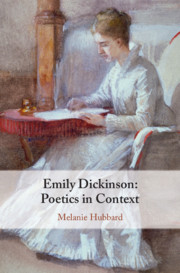Book contents
- Emily Dickinson: Poetics in Context
- Emily Dickinson: Poetics in Context
- Copyright page
- Dedication
- Contents
- Illustrations
- Acknowledgments
- Introduction
- Chapter 1 The Manuscript Variants
- Chapter 2 Dwelling in the Sign
- Chapter 3 Lightning in the Mind
- Chapter 4 “Elate Philosopher”
- Chapter 5 The “Relict of a Friend” and Associative Inscription
- Bibliography
- Index of Poems, Prose Fragments, and Letters
- Index
Chapter 3 - Lightning in the Mind
Dickinson’s Sympathetic Poetics
Published online by Cambridge University Press: 04 June 2020
- Emily Dickinson: Poetics in Context
- Emily Dickinson: Poetics in Context
- Copyright page
- Dedication
- Contents
- Illustrations
- Acknowledgments
- Introduction
- Chapter 1 The Manuscript Variants
- Chapter 2 Dwelling in the Sign
- Chapter 3 Lightning in the Mind
- Chapter 4 “Elate Philosopher”
- Chapter 5 The “Relict of a Friend” and Associative Inscription
- Bibliography
- Index of Poems, Prose Fragments, and Letters
- Index
Summary
Dickinson wants to affect her readers, but not to overwhelm them. Is language’s power literal, its causation direct? Even if it might be, language’s material, sensational aspects must be converted to meanings. The question for Dickinson is to what extent that conversion is automatic, irresistible. Dickinson uses the frameworks of Common Sense and Humean philosophies to think about the nature of power in causation. The more naïve or Common Sense realist version of “electric sympathy” literalizes words’ causative power, while Dickinson’s associationist rhetoric of sympathy observes a skeptical gap between persons. Campbell’s Humean rhetoric insists that cause is attributive and interpretive. Bain’s neuroscience suggests that electricity is integral, not inimical, to the perceptual process. Consistently, Dickinson employs a figurative, ambiguous style which maps onto the recipient’s processes of inference down to the neurological, that is, electrical, level, inducing a lightning in the mind which is the reader’s own power.
Keywords
- Type
- Chapter
- Information
- Emily Dickinson: Poetics in Context , pp. 78 - 116Publisher: Cambridge University PressPrint publication year: 2020



